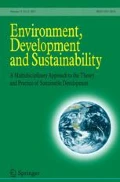Abstract
Interpreting and applying the concept of sustainable development is increasingly viewed as being the way to promulgate just and practicable economic, environmental and social policy. It is thus important that there be increased public and political awareness concerning the origins of economic theory, and its early relationship to sustainability concepts. While the term 'sustainable development' was popularised by the World Commission on Environment and Development report Our Common Future in 1987, it is generally recognised that notions of sustainability were promoted in `limits to growth' and 'green' discourses in the early 1970s (Meadows et al.: 1974, The Limits to Growth: A Report for the Club of Rome, Potomac Associates and Pan Books, London and Sydney). However, there is little acknowledgement of the way in which nineteenth century intellectuals, from a range of disciplines, conceptualised the importance of balancing economic, social and environmental sustainability in their quest for justice and the conservation of nature.
There was a considerable exchange of ideas on `political economy' and nature across Europe, and later the Americas, from the middle of the eighteenth century. This discourse reached its intellectual peak in the nineteenth century. During that era there was a proliferation of literature that was aimed at improving the human condition and recognising humanity's dependence upon nature. In Europe and the USA the participants in the debate included Cantillon, Quesnay, Condorcet, Galiani, Von Hayek, Marx and George. Due to the breadth of this influential body of work, we focus here on the British Victorian thinkers such as Darwin, Malthus, Martineau and Mill. These thinkers influenced each other in developing their theories and ideas in science, politics, economics and philosophy, and were influenced in turn by an earlier generation of intellectuals, such as Adam Smith. For the Victorian thinkers, conserving nature while trying to improve the distribution of wealth was a not a paradox, but a moral duty, and for them Smith's `rational' pursuit of self-interest could only be followed if it did not interfere with 'the rules of justice'. We argue that the manner in which these thinkers conceptualised their theories and ideas represents the nineteenth century origins of sustainability concepts.
Similar content being viewed by others
References
Armstrong, P.H.: 2000, The English Parson-Naturalist: A Companionship between Science and Religion, Gracewing, Leominster.
Baker, R.A.: 1996, 'The great gun of Durham-Canon Henry Baker Tristram, FRS (1822-1906). An outline of his life, collections and contribution to natural history', Archives of Natural History 23, 327–341.
Bentham, J.: 1843, The Commonplace Book, in J. Bowring (ed.), Works, Vol. 10.
Brewster: 2002, Memoirs ofNewton, quoted in Famous Unitarians, Universalists and Unitarian Universalists, http://members.tripod.com/blackcatter/UU/famous2.htm
Commonwealth of Australia: 1994, Summary Report on the Implementation of the National Strategy for Ecologically Sustainable Development, Australian Government Publishing Office, Canberra.
Darwin, C.: 1873, The Descent of Man and Selection in Relation to Sex; first published by John Murray, 1871, the quotations are from the second edition (1873, 1901 reprinting).
David, D.: 1987, Intellectual Women and the Victorian Patriarchy: Harriet Martineau, Elizabeth Barrett Browning, George Eliot, Macmillan, London.
George, H.: 1886, Protection or Free Trade.
George, H.: 1897, The Science of Political Economy.
Gladstone, W.E.: 1866, Speech to the House of Commons on the Reform Bill.
Gould, S.J.: 1990, 'Darwin and Paley meet the invisible hand', Natural History November, 8-16.
Heilbroner, R.: 1972, The Worldly Philosophers. The Lives, Times and Ideas of the Great Economic Thinkers, 4th edn., Simon and Schuster, New York.
Hunt, T.: 2001, 'Revisiting the age of Victoria', Australian Financial Review 25 January (Republished from the New Statesman, London).
Jevons, W.S.: 1881, 'Richard Cantillon and the Nationality of Political Economy', Contemporary Review, January.
Knubley, E.: 1893, 'The protection of wild birds eggs', Naturalist 18, 238–240.
Lumley, S.: 2001, 'Harriet Martineau 1802-1876', in P.H. Armstrong and G. Martin (eds.), Geographers: Biobibliographical Studies, Vol. 21, Continuum, London and New York, pp. 46–64.
Malthus, T.R.: 1966, An Essay on the Principle of Population as it Affects the Future Improvement of Society, published anonymously, 1798, Reprinted 1926 and 1966 with the original pagination, Macmillan, London.
Martineau, H.: 1877, Autobiography: Harriet Martineau's Autobiography with Memorials by Maria Weston Chapman, Vol. 2, Smith, Elder and Co, London.
Meadows, D.H., Meadows, D.L., Randers, J. and Behrens, W.W.: 1974, The Limits to Growth: A Report for the Club of Rome, Potomac Associates and Pan Books, London and Sydney.
Mill, J.S.: 1849, 'Principles of political economy: with some of their applications to social philosophy', in L. Gruen and D. Jamieson (eds.), 1994, Reflecting on Nature: Readings in Environmental Philosophy, Oxford University Press.
Paley, W.: 1825, Natural Theology, London.
Pearce, D.: 1999, Economics and Environment. Essays on Ecological Economics and Sustainable Development, Edward Elgar, Aldershot.
Quesnay, F.: 1758, Tableau Economique, Paris.
Smith, A.: 1759, Theory of Moral Sentiments.
Smith, A.: 1776, An Enquiry into the Nature and Causes of the Wealth of Nations.
UN: 2002, United Nations: Johannesburg World Summit on Sustainable Development, <http://www>.johannesburgsummit.org/html/
WCED: 1987, Our Common Future, World Commission on Environment and Development, Oxford University Press, Oxford
Wollstonecraft, M.: 1792, A Vindication of the Rights of Women, London.
Author information
Authors and Affiliations
Corresponding author
Rights and permissions
About this article
Cite this article
Lumley, S., Armstrong, P. Some of the Nineteenth Century Origins of the Sustainability Concept. Environment, Development and Sustainability 6, 367–378 (2004). https://doi.org/10.1023/B:ENVI.0000029901.02470.a7
Issue Date:
DOI: https://doi.org/10.1023/B:ENVI.0000029901.02470.a7




